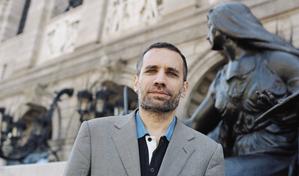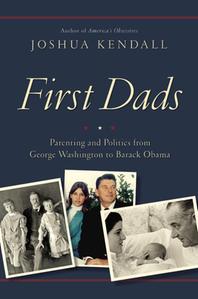
|
|
| photo: Rachel Youdelman | |
Every United States president has been a father in some way, with biological, adopted or illegitimate children. Joshua Kendall's First Dads: Parenting and Politics from George Washington to Barack Obama (Grand Central) is a well-researched and engaging look into the way presidents parented their children, from preoccupied fathers like Franklin Delano Roosevelt and Lyndon Johnson to nurturing parents like Barack Obama and Harry Truman. The stories Kendall gathers are based on interviews with children and grandchildren, as well as presidential correspondence and writings by aides and people who lived with and around the first families, making for a truly fascinating look at the presidents' lives.
What was your inspiration for First Dads?
My last book was called America's Obsessives. It was about people with obsessive personalities who made a mark on American history. There was a chapter on Jefferson--he was such an articulate spokesperson for what it means to be free, but with his own daughters, he was a bit of a control freak. I was like, "Oh my gosh. What's going on here?" Because we think of people as consistent in various realms of life, so that got me started.
I guess the larger issue is that my job is to capture the complexity of people. I think talking about their relationships with their children is a way to bring them alive. What was it like to have breakfast with Teddy Roosevelt? What was it like to spend a weekend with Rutherford B. Hayes or to have dinner with Barack Obama?

That was really interesting for me as I conducted this study to see how fathering has evolved. Fathering in the 21st century is really being shaken up like never before: there's a lot more nurturing. More dads are spending more time with their kids. In the 18th and 19th century, the provider role was the more standard one.
I was amazed to find very, very nurturing fathers like James Monroe. This Virginian was inseparable from his two daughters. That was shocking to see that there could be modern-style dads, though the percentages of these types were much lower in the 18th and 19th century. John Adams--the authoritarian father--is the most extreme of that provider model. I don't know if you remember, but his son was five years old, and Adams is in Philadelphia at the Continental Congress and he said, "Son, you need to become a physician."
What was your father's parenting style?
This book is dedicated to my father. My father was kind of tough. I think I related most to Eisenhower's son, John Eisenhower, who became a writer. With Dwight Eisenhower, John Eisenhower said he always felt like he had to stand at attention. So my father was very strict. My father was also European. He has an amazing story about being a Jewish guy who survived the Holocaust by literally serving in the Nazi army. He was born in 1925, and he was a Jew who passed as a Catholic and went to Jesuit school. He was in Transylvania, and when the Nazis came in, he was conscripted into the Nazi army. He came to America in the '50s, and I was born in 1960.
I was thinking about him as I was writing this book, and I think that was also a motivation: I just had an intense relationship with him. He has this really unbelievable history, and I've spent a lot of my life figuring out my father. I think that's the sort of probing thing--hmm, what kind of dad is Eisenhower? What kind of dad is Obama? What kind of dad is Roosevelt? It's something that I've been thinking about a lot in my own life over the past 20 or 30 years when I see friends and I see their fathers. Maybe that's one of the things that's got me into biography is that my father's history is so confusing because he's Jewish, and he was in the Nazi army, and then he came to America. I didn't even know he was Jewish until I was about 10 years old. So figuring out his life was my first biographical project. That's why I became interested in presidents and other movers and shakers in American culture.
Why is it important to know the parenting style of our presidents?
I think we tend to think of presidents as policymakers, which of course they are, but this book gives some insight into how they make decisions in both their personal life and in their political life. Their decision-making process is a constant, and that's really important because the policies may change. We're electing a president right now, and we don't know what the issues are going to be in two years. But I think if you see how a president raises his children, it gives you an idea of how this person makes decisions. I think that's a valuable thing to think about in terms of electing a president.
Is there anything you researched that you hoped had been in the book but didn't make it?
I only did about half of the presidents. It takes months and months just to do one. I would have loved to have researched and written about them all--I tried. I didn't want the book to be partisan. I wanted to take the long view of history, so I tried to stay away from the Bush family and the Clinton family because, at the time, Jeb Bush was starting to run for president and Hillary Clinton was in the race, and I don't want anyone to see it as a Democrat or Republican book. I'm fascinated by the Clintons, and I would have liked to have had said more about them, but I didn't want to get involved in partisan politics. I wanted to take the long view that American history is full of a bunch of different types of characters and they're going to pop up time and time again and people should just start recognizing them.
What I'm really trying to get at is that human side--that we to see presidents as these gods. Maybe after reading my book, they feel a little bit more real. --Rob LeFebvre, freelance writer and editor

